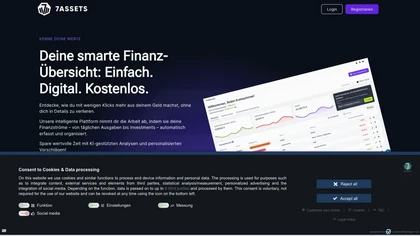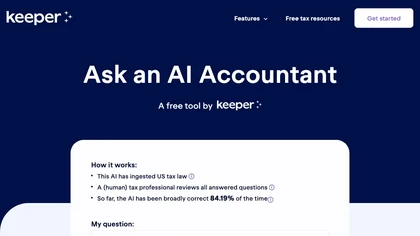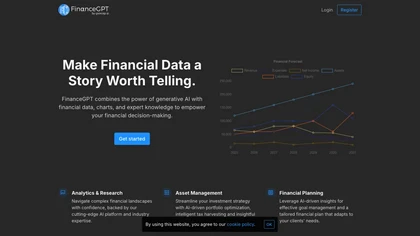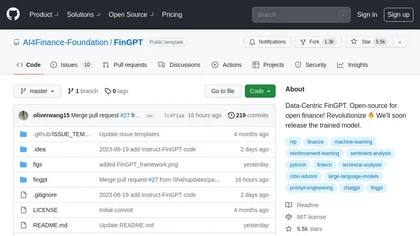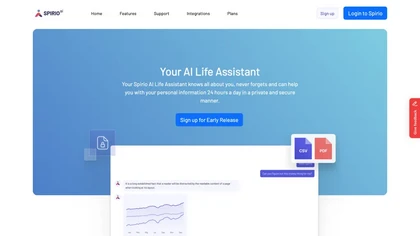AI use cases for Digital financial management
Generative AI can be applied in various applications for digital financial management. Here are some examples to explore below for inspiration with AI tools to get you started with using AI in digital financial management.
🛠️ 70 AI tools for Digital financial management
Explore a dynamic list of some of the most popular tools to get you started with various AI use cases and applications for Digital financial management to streamline your workflows and productivity today.
Tendi features
- AI-powered personal financial advisor
- Assists in setting financial goals, planning, budgeting, and achieving milestones
- Analyzes spending, saving, and investing behaviors
- Provides actionable insights and personalized financial advice
- Ensures data security through advanced encryption and strict privacy protocols
Mint features
- Financial transaction tracking
- Account linking with over 17,000 financial institutions
- Categorization of transactions
- Insights on monthly spending habits
- Expense tracking and analysis
GoodBudget features
- Virtual budget program
- Budget tracking
- Sharing budgets
- Web, Android, and iPhone availability
- Debt payment tracking
Cleo features
- Budgeting assistance
- Cash flow tracking
- AI-powered features
- Secure platform with encryption
- Financial decision insights
Monarch money features
- Net worth syncing
- Budgeting
- Recurring investments
- Spending insights
- Collaborative solutions
RocketMoney features
- Automated subscription tracking
- Spending insights across multiple accounts
- Bill negotiation services
- Net worth tracking
- Smart savings options
Qashboard features
- Financial data analysis
- Automated transaction tracking
- Conversational AI interface
- Secure data storage control
- Finance-related Q&A feature
🔥
Create your account, save tools & get personal recommendations
Receive a weekly digest of our handpicked top tools.
Unsubscribe anytime
Otto features
- Debt management
- Centralizing accounts
- Insights and recommendations
- Real-time monitoring
- Smart debt payoff strategies
Zumma features
- Budget creation
- Income and expenses tracking
- Receipt scanning
- Community access for finance resources and tips
- Availability in select cities
F.I.R.E on track features
- AI-powered financial assistant
- Personalized recommendations based on goals
- Real-time financial assistance
- Income, expenses, and savings tracking
- Goal reminders and progress tracking
Wally.me features
- Expense tracking
- Bill monitoring
- Budget management
- Financial insights and guidance
- Personalized Q&A with WallyGPT
neonFin features
- AI-powered receipt scanning
- Engaging points system for gamifying budgeting
- Real-time insights into spending habits
- Lifestyle budget creation
- CO2 emissions tracking
RetireMint features
- Virtual retirement planning assistant
- Assessment of retirement readiness
- Personalized feedback and advice
- Professional assessments in various retirement-related areas
- Comprehensive retirement roadmap building tools and resources
Origin features
- Holistic net worth tracking
- Smart recommendations for achieving financial milestones
- AI-powered planner for real-time financial queries
- Guidance from certified financial planners
- Automated investing guidance without advisory fees
Fudget features
- Multi-platform support
- Fudget Basic with 5 budgets and 250 entries
- Fudget Plus subscription for advanced features
- Budgeting across multiple devices
- Real-time sharing with a partner
Expense Sorted features
- Expense classification
- Customizable expense categories
- Manual adjustments
- Integration with google sheets
Kniru: AI-Powered Finance features
- Hyper-personalized financial management
- Precise and actionable insights
- State-of-the-art notifications
- Seamless connections to multiple accounts globally
- Anomaly detection for your portfolio
7Assets features
- Automated data capture
- AI-powered analyses
- Personalized suggestions
- Secure data management
- All-in-one asset management
Mezzi features
- Personalized steps to save on capital gains taxes
- Reduce fund fees
- Optimize portfolio allocation through advanced calculators and AI-powered suggestions
- Compare performance and allocations across different accounts for easy rebalancing
- Ad-free platform prioritizing data privacy and security
Finalle features
- Twitter analysis
- Reddit analysis
- News analysis
- Blog post analysis
- Market insights
Moning features
- Global view of wealth management
- User-friendly dashboard for asset tracking and management
- AI analysis for investment strategy enhancement
- Dividend anticipation and tracking tools
- Access to exclusive dividend growth and safety scores
PennyFlo features
- Integrations
- Simple Visualization
- All-in-one solution
- Advanced Analytics
- Powerful Automation
Parthean AI features
- Automate financial tasks
- Streamline money management
- Automatic saving, investing, and debt repayment
- Facilitate money transfers between accounts
- Provide insights on spending, investing, and credit
Lifesage features
- Health
- Wealth
- Wisdom
- Personal development
- Self-improvement
PortfolioPilot Insights features
- Personalized investment recommendations
- 360° portfolio analysis
- Tailored suggestions based on individual portfolio needs
- Continuous monitoring of the economy for risks
- Automated investment recommendations based on asset allocations
EpicTopia AI features
- Life journey tracking
- AI-generated insights
- Tailored action plans
- Personalized chronicle on a timeline
- Detailed guidance
PortfolioPilot features
- 360° portfolio analysis
- Hyper-personalized recommendations
- Economic insights engine
- Automatic risk identification
- Bank-level security
Keepertax features
- Ask tax questions
- Cpa fact-checking
FinanceGPT features
- Generative AI technology
- Customizable financial forecasting
- Real-time data aggregation
- Advanced analytics
- Targeted towards investors, financial managers, and accountants
FinCheck by Trezy features
- Financial health assessment
- Annual statements analysis
- Multilingual reports
- Privacy control
- Security features
FinGPT features
- Llm training
- Nlp finetuning
- Finance
Digits — Accounting features
- 24/7 automated bookkeeping
- AI Advisor for financial analysis & insights
- Intuitive Reports for non-finance professionals
- Live Finance Dashboards for easy business monitoring
- Bank-grade Security for data protection
Onesta features
- Ask finance related questions
- Provide financial advice
- Answer financial queries
- Assist in managing finances
- Offer personalized investment recommendations
Fortune features
- Automated transaction categorizations
- Detailed financial analytics
- Forecasting finances across various banks worldwide
- Real-time alerts for every transaction
- Advanced transaction search capabilities
Magnifi features
- Conversational AI guidance
- Goal planning
- Investment search
- Comparison features
- Whole-portfolio tracking
Kairos Financial features
- Personalized financial analysis
- Step-by-step recommendations
- Priority setting assistance
- Product tracking
- Financial literacy resources
FinanceGPT Chat features
- Build custom AI co-pilots
- Semantic search for understanding
- Document upload for tailored answers
- Data source connectivity
- Personalized financial insights
Simpla AI features
- Personalized tax advice in seconds
- Cutting-edge tax solutions
- AI-powered document processing for automating financial systems
- Upload financial statements for in-depth analysis
- Data security and insightful analytics
Gear Caliber features
- Comparison tools for phones, cell plans, tablets, eReaders, credit cards, VPN
- Credit Card Comparison Tool
- Cell Phone Savings Calculator
- Latest Guides on various tech products
- Independent and unbiased reviews
Celeste features
- Debt management
- Tailored for small and medium businesses
- Emphasis on privacy
- User-friendly interface
- Advanced functionalities
ProAI features
- Business strategy generator
- Interactive Guidance and follow up
- Metrics monitoring and insights
- Market research
- Financial forecast
- Pitch deck generator
Plan Quest features
- Visual timeline
- Objectives and key results (OKRs)
- Notion-like editor
- Reflection canvas
- Timeline visualization
GIGAMATIC features
- Financial management tools
- Cloud-based 'work wallet'
- Advanced analytics and personalized insights
- Tailored lending products and insurance plans
- Decentralized, encrypted network for data security
FolioProjects features
- AI project management assistant
- Data-rich dashboards for analysis
- Project portfolio management workflow
- Enterprise asset management life cycle support
- Predictive, prescriptive, and generative AI capabilities
FinanceBrain features
- AI-powered tool
- Instant answers to finance and accounting questions
- 24/7 chatbot support
- Free questions upon sign-up
- Quick responses
Harriet.ai features
- Clear financial picture at a glance
- Expense tracking
- Cash flow maximization
- All-in-one dashboard for financial management
- Flat-fee bookkeeping service
Ideabuddy features
- Idea validation
- Financial planning
- Step-by-step business guide
- Collaboration with team members
- Export of documents
Todobot
4.8Todobot features
- Virtual coach
- Ai task breakdown
- Personalized coaching system
Entendre Finance features
- Automated blockchain activity tracking
- Real-time financial analytics
- Bulk configuration capabilities
- Month-end bookkeeping automation
- Multi-entity support
Mentor v1 features
- Goal breakdown into manageable tasks
- Step-by-step guidance for goal achievement
- Progress tracking on a dashboard
- Email notifications for upcoming tasks
- Personalized notes and guidance customization
Decode.tax features
- Data analysis for tax optimization
- Secure storage and sharing of tax returns
- Covering various tax aspects
- Recommendations for lowering tax bills
- Option to delete information at any time
Uprise Embedded features
- AI-powered financial advisory platform
- Personalized financial optimization engine
- Automating regulatory compliance
- Concierge services for comprehensive financial planning
- Flexible integration options and white-label solutions
Leap Learning features
- Personalized guidance
- Comprehensive collection of video-based text-based formats
- Flexible content types for different learning preferences
- Subscription service with beta testing phase
- Focus on utility in various subjects like business strategy, management, finance, data science
InfoBot features
- Generate reports
- Specialize reports
- Strategy analysis
- Portfolio analysis
Lebenmaster features
- 3-step process for goal forecasting
- Daily progress logs
- Task management functionality
- Brainstats feature
- Support for executing tasks faster and efficiently
AIcoachbud features
- Motivational coaching
- Reminders
- Progress tracking
- Actionable insights
- Accountability buddy
MealMate
5MealMate features
- Plan meals
- Tailor dietary preferences
- Consider budget
- Adjust for time constraints
SparkReceipt features
- Receipt scanning
- Expense tracking
- Business document management
- Accountant collaboration
- Cloud access
1st things 1st features
- Prioritization
- Smart comparison
- Customizable templates
- Ai-powered autosuggestion
- Goal alignment
AdmitGPT features
- Personalized college recommendations
- Essay feedback
- Interview preparation
- Scholarship navigation
- Real-time feedback
Mesha features
- AI-driven bookkeeping and tax solution
- Powered by real human bookkeepers and CPAs
- Accurate monthly financial statements and tax filings
- Tailored insights with real-time financial reports
- Full range of tax solutions with certified tax advisors and CPAs
BeatandRaise features
- Financial search
- Financial real-time information
- Company performance predictions
- Revenue insights
- Chatbot plugin
Deborah features
- Web-based
- Free over-the-phone updates
- JavaScript enabled
- 3-minute portfolio digest
- AI financial analyst
Spirio AI features
- Personal productivity assistant
- Organizing crucial tasks and reminders
- Document gathering and organization
- Data security prioritization
- 24/7 availability
Stonks GPT
3.6Stonks GPT features
- Search news related to top 100 stocks
- View charts for popular stocks over the last 30 days
- View charts for uber, lyft and doordash over the last 3 months
- Access insider news
- Use a user-friendly interface
Magicflow.com features
- Live flow timers
- Focus sessions
- Pomodoro timers
- Distraction warnings
- Glowing flow meter
CreditHQ features
- Analyze credit history
- Compare interest rates
- Tailored loan offers
- Credit score simulator
- Zero-coding development environment


















